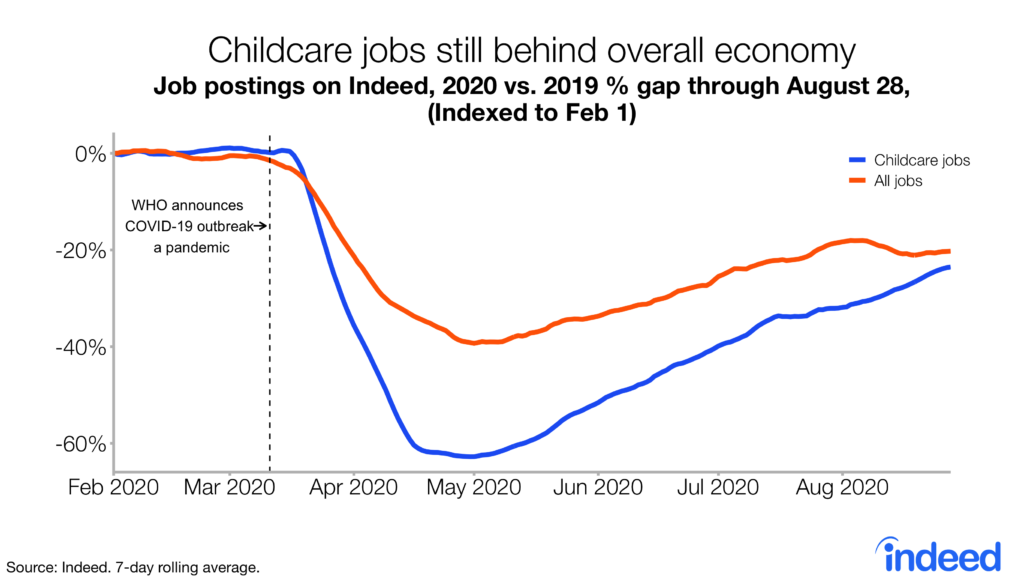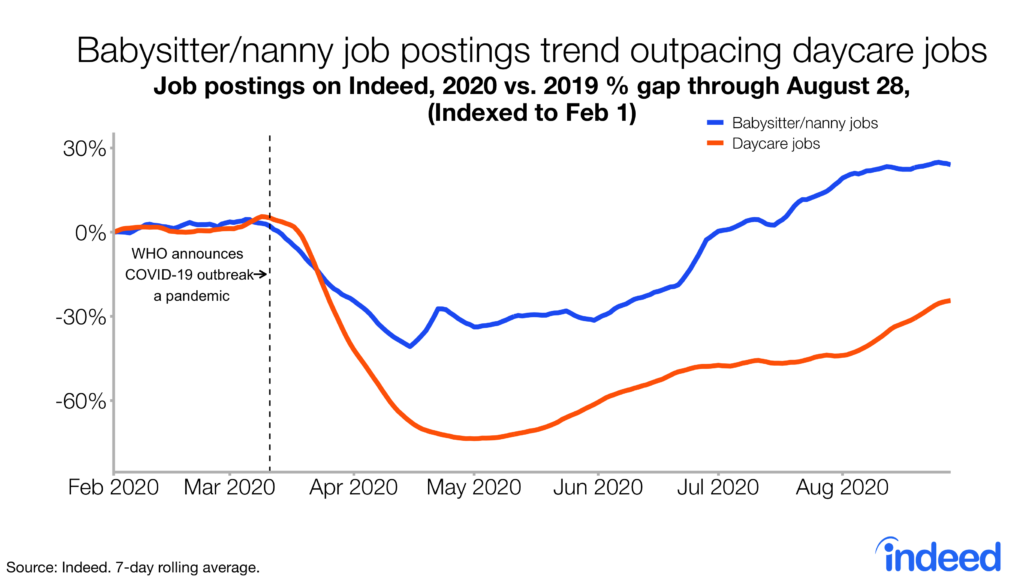
Source: https://www.indeed.com/lead/state-of-childcare-jobs-and-parenting-during-covid-19?hl=en&co=US
As the coronavirus crisis drags on, bringing with it more social distancing requirements and continued disruptions to the workplace, a crucial piece of the puzzle remains unsolved: childcare. Though some schools and daycare centers have reopened, many are still conducting classes entirely online, and almost none are back to their pre-COVID capacities. Even families with support are still struggling with parenting during COVID-19.
As we’ve repeatedly seen, COVID-19 has not affected all populations equally. And, the challenge for parents has been particularly monumental. A child bursting into a Zoom meeting might be the top concern for the most fortunate. But for others, the need to care for children around the clock means they have to work less, or not at all: By late June, 13% of parents had reduced their work hours or quit their jobs entirely because of a lack of childcare.
We sat down with AnnElizabeth Konkel, an Indeed economist who recently wrote about childcare jobs in the U.S., to learn what childcare job postings on Indeed can tell us about this labor sector, as well as about the struggles of parenting during COVID-19 — and what this means for employers and job seekers alike.
What are the key findings on childcare jobs?
Childcare job postings include jobs at daycare centers, as well as nanny and babysitter positions. The numbers of these jobs dropped dramatically during the early days of the pandemic: By April 30, they were trending 63% below the previous year. Demand for childcare workers has risen since then (as of Aug. 28, the trend had climbed upward to just 24% below 2019 levels), but the problem is far from solved.

Compared to all job postings, childcare job postings haven’t been able to close the gap entirely — they still trend lower than overall jobs. Because of changes and limitations to how childcare facilities can operate, and because so many parents are now caring for children at home for more hours than they used to, millions of workers’ lives have been affected. And, the impact has implications that extend beyond just this sector.
About 41% of U.S. workers aged 20-54 have a child. With so much of the workforce affected, the health of the economy as a whole depends on parents being able to work. Flexibility from employers is a good way to help parents continue to work amidst the current childcare constraints.
What does this mean for employers?
As debates and plans for reopening offices in the U.S. abound, the challenges of the pandemic have reminded us that workers don’t exist in a vacuum.
Employers of childcare workers have had to completely rethink how they do business. These extreme changes include minimizing contact between employees and children; changing hours; beefing up cleaning practices; and creating illness contingency plans.
Even if childcare centers were to reopen at pre-COVID capacities, demand for childcare outside the home has decreased — likely due to parents’ concerns about the spread of the virus. For those who do want to send their children to daycare, there are now fewer options to choose from. This decrease in options, combined with the extra costs childcare centers are now incurring for things like personal protective equipment (PPE) and extra cleaning, will likely make childcare even less affordable in the future.
What’s more, “this isn’t an issue just for the childcare sector,” as AnnElizabeth points out. “It’s an issue for all employers, because all employers employ parents.” And for employees with kids, concerns go far beyond how to safely work in an office; without childcare, they can’t show up in the first place.
As long as parents can’t — or don’t want to — access external childcare for safety reasons, they will struggle to work at the same levels as before, AnnElizabeth explains, which could deepen the economic crisis by decreasing production and spending.
“Childcare is essential to a fully functioning economy,” she says, and recommends that employers focus on flexibility to help out parents.
Even before COVID, mothers were explicitly asking for more flexible work arrangements — and 80% of moms say they are now doing the majority of homeschooling during the pandemic. As we continue to adjust to a new way of living and working, employers might be better able to attract and retain workers by allowing them — especially those with children — flexibility in terms of factors such as location and working hours.
Job postings for babysitters and nannies are actually trending 24% higher than last year.
What does this mean for job seekers?
Not all childcare jobs are the same, and demand for certain types of care workers has actually increased during coronavirus: While demand for daycare center staff is lagging behind, job postings for babysitters and nannies (which AnnElizabeth refers to as “bespoke” childcare) are actually trending 24% higher than last year.
This disparity is likely due to safety concerns. Sending children to schools and daycare facilities still isn’t possible in many places, and even where it is, such gatherings pose health risks parents may not want their kids to face. Instead, it seems, many parents are opting to bring individual care workers into their homes. As a result, there are fewer opportunities in daycare facilities than in bespoke care, and there are not as many of these childcare jobs as were available before COVID.

Here, AnnElizabeth makes a very interesting observation: “The demand for babysitters and nannies is probably even higher than what we see in job postings, because these jobs are often part of the informal economy, which we can’t measure here.”
Conclusion
As we enter the fall, it doesn’t look like the pressure of parenting during COVID-19 will ease up anytime soon. Childcare workers may be able to find work and support families more easily through nannying or babysitting.
All employers, whether in the childcare sector or not, are affected by the particular struggles parents are facing. Prioritizing flexibility for employees could help employers retain talent, and ensure that working parents can contribute to the best of their abilities.
To learn more about the data behind this article and what Indeed has to offer, visit https://www.indeed.com/.







Sign up to receive our stories in your inbox.
Data is changing the speed of business. Investors, Corporations, and Governments are buying new, differentiated data to gain visibility make better decisions. Don't fall behind. Let us help.













Sign up to receive our stories in your inbox.
Data is changing the speed of business. Investors, Corporations, and Governments are buying new, differentiated data to gain visibility make better decisions. Don't fall behind. Let us help.





